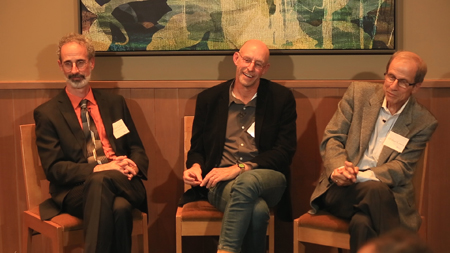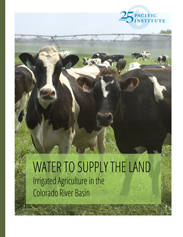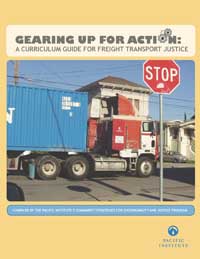|
|
November 2013 Online Update
|
|
|
|
Twenty-five years ago, the Pacific Institute began incubating a powerful idea: that we can use sound science and an interdisciplinary approach to fundamentally reshape the way we think about resources and society - especially water, climate, energy, food, and community health. Fast forward a quarter of a century, and we have been a local-to-global, David-to-Goliath force for sustainability, impacting issues from the human right to water, to freight transport impacts on low-income communities, to avoiding violent conflict over natural resources.
The next 25 years will require us to be even more nimble and far-reaching. The Pacific Institute is ready to meet the challenges of today - and tomorrow - with your support. We have launched the Impact Fund to do just that. Learn more about it in our feature story and join us in our efforts to tackle the most critical sustainability and justice issues of our time. Make an Impact!
|
|
Pacific Institute Impact Fund Kick-Off includes Panel with Peter Gleick, Michael Pollan, and Michael Krasny
The Pacific Institute is excited to announce the launch of the
Impact Fund, our major campaign to both increase our rapid-response capability to tackle urgent short-term needs, as well as provide capacity to further our efforts for the long view
- not just for the next year but for the next generation.
The target is to raise $3-to-5 million by 2016.
 | |
KQED's Michael Krasny (right) moderates a discussion with Peter Gleick (left) and Michael Pollan on "Water and Food in a Changing World."
|
The campaign kicked off on November 6 with a high-powered panel at Greens Restaurant in San Francisco featuring Pacific Institute President Peter Gleick, author and food activist Michael Pollan, and KQED Forum host Michael Krasny, who moderated a discussion between Gleick and Pollan on Water and Food in a Changing World. (Watch Online Updates for a link to the video soon!)
Dr. Gleick said, "We believe that for the problems of environmental destruction, economic and social inequity, and conflict, there are practical, science-based, humane, and very achievable solutions. We believe that good science - tested, peer-reviewed, reputable - and knowledge are beacons pointing the way to solutions and also expose false science used by special interests. We also believe that this kind of verifiable science provides policymakers and others with the answers to the planet's persistent, unresolved problems that we all so urgently seek."
Sustainably managing the world's water supply, planning for climate change, ensuring communities have a voice in decision-making, eliminating environmental inequities, supporting a thriving economy and environment: these are the critical challenges of our time. And these are the issues the Pacific Institute researches, influences, and responds to, impacting what happens today - with a vision for the future.
Please give to the Impact Fund! We need your support to:
- Fundamentally reshape the world of water.
- Prepare the planet for now unavoidable climate change.
- Provide safe water and sanitation for all.
- End violent conflict over access to water.
- Bring the corporate sector and the environmental community to a common understanding about sustainability.
- Make sure that local communities have a voice in decision-making in order to end environmental inequities.
You'll be hearing more about the Impact Fund!
www.pacinst.org/impact - Give today.
|
|
|
From the
Pacific Institute Insights Blog
Peter Gleick Op Ed and Blog
|
|
|
|
|
"Water to Supply the Land" Describes Irrigated Agriculture in the Colorado River Basin
 Earlier this year, the Institute released a report on irrigated agriculture called Water to Supply the Land: Irrigated Agriculture in the Colorado River Basin. The magnitude of a continuing 14-year drought in the Colorado River basin and subsequent shortages in the Upper Basin, as well as likelihood that a shortage will be declared in the Lower Basin within the next few years, has increased attention on agricultural water use within the basin. Communications Intern Joe Ferrell spoke with the lead author of the report, Michael Cohen, to highlight key findings. Earlier this year, the Institute released a report on irrigated agriculture called Water to Supply the Land: Irrigated Agriculture in the Colorado River Basin. The magnitude of a continuing 14-year drought in the Colorado River basin and subsequent shortages in the Upper Basin, as well as likelihood that a shortage will be declared in the Lower Basin within the next few years, has increased attention on agricultural water use within the basin. Communications Intern Joe Ferrell spoke with the lead author of the report, Michael Cohen, to highlight key findings.
Water to Supply the Land compiles and compares data from state and federal agencies on irrigated land and water use. The report finds that more than 90 percent of pasture and cropland in the Colorado River basin receives supplemental water to make the land viable for agriculture. This irrigated land extends across some 3.2 million acres within the basin, while water exported from the basin reportedly helps irrigate another 2.5 million acres in Colorado, Utah, New Mexico, and southern California. Irrigating this much land requires a lot of water, consuming roughly 70 percent of the basin's water supply (not including evaporation or exports). One of the prominent features of the report is a series of scenarios that explore different methods to make irrigation more efficient. When implemented, these methods could help to bridge the water supply-demand imbalance that has driven reservoir storage down by 50 percent in the basin and that threatens future water availability.
Read the blog post here.
Read the report here.
|
|
Haciendo Conexiones Workshop Links Spanish-Speaking Residents to Community Health Resources
 Catalina Garz�n, director of the Community Strategies for Sustainability and Justice Program, and Jessica Parra-Fitch, popular education associate, helped to facilitate a community workshop on freight transport and community health at the Cesar Chavez Branch of the Oakland Public Library. The Haciendo Conexiones/Making Connections workshop was held in partnership with the Ditching Dirty Diesel Collaborative, the Alameda Healthy Homes Program at the Alameda County Public Health Department, and Contra Costa Health Services. The workshop was conducted in Spanish and drew on activities from the Institute's recently released Spanish-language version of the Gearing Up for Action curriculum guide on freight transport and community health. Catalina Garz�n, director of the Community Strategies for Sustainability and Justice Program, and Jessica Parra-Fitch, popular education associate, helped to facilitate a community workshop on freight transport and community health at the Cesar Chavez Branch of the Oakland Public Library. The Haciendo Conexiones/Making Connections workshop was held in partnership with the Ditching Dirty Diesel Collaborative, the Alameda Healthy Homes Program at the Alameda County Public Health Department, and Contra Costa Health Services. The workshop was conducted in Spanish and drew on activities from the Institute's recently released Spanish-language version of the Gearing Up for Action curriculum guide on freight transport and community health.
In addition to making connections between diesel traffic and quality-of-life concerns such as pedestrian safety, the workshop featured guest speakers from the Healthy Eating Active Living (HEAL) Initiative in Concord's Monument Corridor and TransForm about community organizing and advocacy efforts for transportation justice and healthier neighborhoods. Attendees shared their experiences with diesel truck and train traffic in the Fruitvale District and East Oakland and wrote in their evaluations that they felt more empowered to make changes in their communities as a result of participating in the workshop. For more information, or to learn more about how to bring a workshop like this to your community, please contact Program Director Catalina Garz�n at [email protected] or at 510.251.1600 x108.
Read the Gearing Up for Action curriculum guide in Spanish and English.
|
|
Pacific Institute Seeks Business Managers for Survey on Water-related Business Challenges
The Institute's Corporate Sustainability Program recently launched an online survey as part of a project, conducted in partnership with VOX Global, to better understand U.S.-based company perspectives on the water-related challenges businesses face here in the States and how they are going about addressing those challenges, if at all. The project team invites U.S.-based companies to participate in this survey so that their perspectives and insights are captured in the final report to be released in the first quarter of 2014. While the results of this study will be released publicly, all data will be released in the aggregate, and individual responses are strictly confidential.
To access the survey, Company Perspectives on Water Challenges and Response Strategies in the United States, go to: https://www.surveymonkey.com/s/companywaterchallenges.
|
|
Peter Gleick Op Ed: Why I'm Still Confused about the Proposed Tunnels in the Delta
In a Sacramento Bee Op-Ed on November 6, Pacific Institute President Peter Gleick answers the question of what he thinks about California's massive tunnel project to divert water from the Sacramento River to the conveyance aqueducts south of the Delta - with some pointed questions of his own:
-How much water will this new system take out of the Delta?
-What will this infrastructure, or the water it provides, cost?
-Who's going to pay for it?
-Can I look at a cost-benefit study or an evaluation of alternative options?
-Will the ecosystem repairs and restoration happen along with the infrastructure construction?
-What rules will govern its operation and who will strictly monitor and enforce those rules?
-What provisions will be put in place to change the operating rules as climate change increasingly alters water conditions and in the event that new science shows new problems or advantages?
Dr. Gleick concludes: "Honest and complete answers to the questions posed above must be provided if California voters and decision-makers are to make informed choices about the path forward for California water. Good water policy in California will only come about if it is guided by sound science, eyes-open analysis, and public transparency."
Read the full Op-Ed here.
|
|
In Brief
Staff News
Dr. Juliet Christian-Smith, who has worked with the Institute on a wide range of projects over the past five years, has moved to the Union of Concerned Scientists as a climate scientist. We were delighted to have her here at the Institute and look forward to continuing to work with her in her new position.
Pacific Institute staff members gave talks and lectures, conducted workshops, and participated on panels far and wide this month. Here are some of the places we've been:
Heather Cooley, Water Program Co-Director:
- gave a presentation at the CalDesal Annual Conference in San Diego on the energy requirements for seawater desalination.
- gave a presentation in Sacramento at the Water Energy Team of the Climate Action Team's monthly meeting on water rates and revenue stability.
-made a presentation titled "Sea Level Rise and California's Infrastructure" at the California Assembly Hearing for the Select Committee on Sea Level Rise and the California Economy and Select Committee on the Ports in Long Beach, Calif.
- gave a keynote talk on the water-energy nexus at the 224th Electrochemical Society meeting in San Francisco, Calif.
- led a discussion at the California Water Plan Update 2013 Plenary on California's Water Footprint in Sacramento, Calif.
Michael Cohen, Water Program Senior Research Associate:
- presented on the future of the Salton Sea and the need for decisive action at the 5th Annual Imperial Valley Environmental Health Leadership Summit at Imperial Valley College.
- presented "Bridging the Water Supply-Demand Imbalance in the Colorado River Basin" at
Adapting to a Water-Stressed West, hosted by the American Association for the Advancement of Science, Southwestern and Rocky Mountain Division Water Forum, in Tempe, Arizona.
Kristina Donnelly, Water Program Research Associate, and Heather Cooley, Water Program Co-Director:
- presented at the California Municipal Utilities Association Annual Meeting in Sacramento, Calif. on the opportunities for water and energy utilities to partner with one another in support of water conservation and efficiency to save water and energy.
Catalina Garz�n, Community Strategies for Sustainability and Justice Program Director:
- presented on the popular education tools featured in our Gearing Up for Action curriculum guide as part of the webinar series "Creating Healthy Neighborhoods: Outdoor Air Pollution, Health Impacts and Community Trainings," hosted by California Asthma Partners.
Dr. Peter Gleick, President:
- gave a talk on "Who Wins the Water," at the SXSW Eco-Conference with Circle of Blue's Carl Ganter, Banyan Water's Jeff Fulgham, and CERE's Charlene Leurig.
- attended the California County Planning Commissioners Association Annual Conference and gave the keynote presentation on California water policy.
- attended the NAS Sackler Symposium at 150: Celebrating Service to the Nation in Washington D.C. and spoke on a panel on climate science and policy.
- gave the keynote address Fairmount Water Works 10th Anniversary in Philadelphia, Pennsylvania.
- participated on a panel at the 2013 Philomathia Symposium on Water titled "Water, Climate and Society: Challenges and Strategies in a Rapidly Changing World" in Berkeley, California. Dr. Gleick also gave a talk on "Water, Cities, and Infrastructure: Innovations in Technology and Affordability."
Mai-Lan Ha, Corporate Sustainability Research Associate:
- participated as a judge for AT&T-EDF's Ideathon, "How Would You Address the Water Crisis," at the 2013 Net Impact conference.
|
|
In the News
Ensia Magazine quoted Senior Research Associate Dr. Juliet Christian-Smith on new minds entering the water utilities field. Read it here.
Dr. Peter Gleick spoke on the International Monetary Fund Podcast about how we need to radically change how we consume water. Listen to it here.
Dr. Gleick also spoke at Philadelphia's Fairmount Water Works Interpretive Center's 10th Anniversary celebration to discuss world-wide water challenges with his talk "Global Water Challenges and Solutions." In anticipation of the event, Peter Gleick participated in interviews with CBS Philly and the Green Philly Blog.
John Fleck from the Albuquerque Journal interviewed Senior Research Associate Michael Cohen about the steep decline in Albuquerque's water use this year. Mr. Cohen talks about the long-term behavioral changes in water conservation caused as a result of droughts. Read it here.
Michael Cohen also spoke with Michael Gardner from UT San Diego to talk about the advancement of the Salton Sea Pact. Read more here.
Once again, read Dr. Peter Gleick's Op-Ed in the Sacramento Bee on California's proposed tunnels in the Delta here.
|
|
Quick Links
  |
|
|